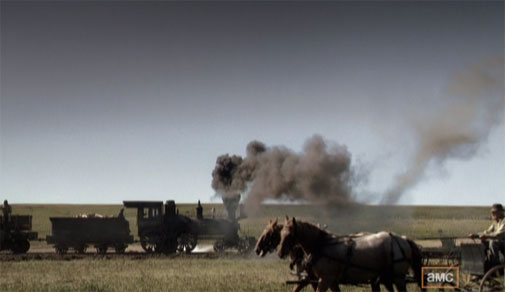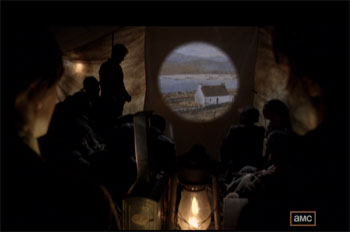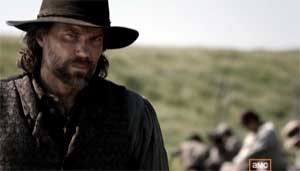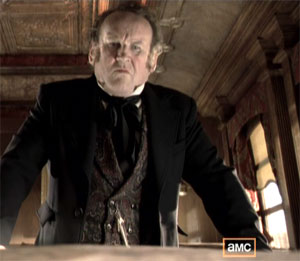
In the past five years, in its current quest to provide original quality TV series, AMC has given us Mad Men, Breaking Bad, Rubicon, The Walking Dead and The Killing. Except for a frustrating non-ending to the first season of The Killing, and a disappointing non-renewal of Rubicon, that's a hot streak to rival that of Pixar -- one great artistic and critical success after another.
But with Hell on Wheels, the cable network's new Western series about railroad expansion in the post-Civil War era, AMC's run of impressive, innovative television goes completely off the rails...
It's totally understandable why AMC is eager to have a Western series on its schedule. Just before launching Mad Men in 2007, the network notched its first major original-programming success the year before with Broken Trail, a Western miniseries starring Robert Duvall. Duvall, of course, has the star of CBS's 1989 Lonesome Dove, one of the greatest miniseries, and greatest TV Westerns, ever made. And Broken Trail was a huge hit, too, drawing nearly 10 million viewers (9.8 million, to be precise) -- a feat no AMC series to date has duplicated.

And in parts, frame by frame, Hell on Wheels does indeed look like just the sort of epic Western viewers may be ready and eager to embrace. The framing of some images is reminiscent of the artistic tableaus of Breaking Bad -- and one scene in the pilot, during which opportunistic entertainers at the work camp charge admission to a newfangled "Magic Lantern" show, is itself a marvelous display of shadow and light.
The promos for Hell on Wheels, which premieres Sunday night at 10 ET on AMC, make it look as though AMC has yet another home-run winner on its hands. It looks great. But in this particular case, the casting isn't as inspired, the acting isn't as impressive or involving, and the scripts, at least in the first five episodes, are a major disappointment.

Anson Mount plays Cullen Bohannen, a Southern man who freed his slaves during the Civil War, and has now embarked on a one-man wave of revenge, seeking out the soldiers and officers in Sherman's Army who, during their Southern march, brutalized and murdered Bohannen's wife. To get closer to his future victims, Bohannen takes a job on a work crew competing for government work on the Transcontinental Railroad.
The basic structure of Hell on Wheels seems to borrow, almost cynically, from ongoing AMC series successes. Bohannen is a quiet loner with a mysterious past, like Don Draper in Mad Men. He'll do whatever it takes to survive, and some of his choices darken his soul, like Walter White in Breaking Bad. He's driven to solve a brutal crime, like the investigators of The Killing. And there are threatening, frightening figures lurking in the woods and prowling the landscape, like the zombies of The Walking Dead -- only here, they're Native Americans, literally on the warpath.
Those comparisons all work, to a point. Thanks to the recurring theme of homicidal revenge, so does thinking of Hell on Wheels as a sort of Little Dexter on the Prairie. But the real comparison here is to David Milch's superb HBO Western series, Deadwood, set in the Dakota territory during the Gold Rush era.
And once you make that comparison, all bets -- and all wheels -- are off.
Deadwood was one of the best TV series ever written, and had a cast up to the task of delivering the show's dense, surprising, shocking, deliciously textured lines and scenes. Hell on Wheels, by comparison, manages about two strong scenes in five hours of screen time. Otherwise, everything and everyone is too obvious, too strained, too telegraphed, and too boring.

Colm Meaney plays the only based-on-fact character in Hell on Wheels, portraying greedy, Machiavellian railroad magnate Thomas "Doc" Durant. Meaney does what he can what he's given, which isn't much -- the show's writer-creators are brothers Tony Gayton and Joe Gayton, whose biggest credit may be last year's Dwayne Johnson action movie, Faster.
But think of Ian McShane as Al Swearengen in Deadwood, or Gerald McRaney as George Hearst, and you'll get a sense of the potential that was missed here. And the story of Manifest Destiny, told so superbly in Deadwood, is another grand tale only touched upon here.
In Hell on Wheels, there's a lot of care given to the look of the show. Like Deadwood, it gets the mud right, and the isolation, and the new construction as a town is built up around them. The dirty whores are just that -- smeared with dirt, mud, grime and attitude. The various ethnic groups jockeying for position and survival -- the Chinese, the Swedes, the blacks, the Irish and, of course, the Indians who were there first -- are all represented.
But when they open their mouths, no matter what language they speak or accent they sport, they always reveal exactly what they're thinking, planning, doing and wanting. The writing is that ham-fisted, the drama that obvious. Bohannen kills a man in cold blood in the very first scene, just so we'll know he's an anti-hero. Durant reveals the tricks of his trade to underlings like he's conducting a remedial seminar on corporate evil.
Somewhere in the midst of its impressive run of series successes, AMC revived Patrick McGoohan's 1968 CBS miniseries The Prisoner, and remade it so ineptly, it made you wonder whether anyone involved understood the pull and power of the original in the first place. Hell on Wheels evokes a similar reaction.
The Western, on TV, once was the dominant form of prime-time entertainment. Yet rather than helping to bring the Western back, Hell on Wheels makes you wonder how it ever dominated TV in the first place.
--
(For a more forgiving and positive take on Hell on Wheels, see TVWW contributor Eric Gould's Cold Light Reader review HERE.)